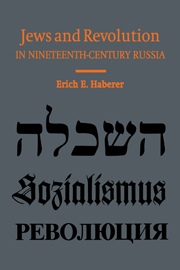Book contents
- Frontmatter
- Contents
- Preface
- 1 Introduction: The beginnings of Russian–Jewish radicalism, 1790–1868
- Part 1 The Chaikovskii circles: Jewish radicals in the formative stage of revolutionary Populism, 1868–1875
- 2 Jewish student activists in St Petersburg
- 3 Chaikovskyist Jews in Moscow, Odessa, and Kiev
- 4 The rebellious Jewish youth of Vilna
- 5 Socialist Jews and Russian Populism
- Part 2 The Land and Freedom Party: Jews and the politicization of revolutionary Populism, 1875–1879
- Part 3 The Party of the People's Will: Jewish terrorists of socialist conviction, 1879–1887
- Appendix
- Abbreviations
- Notes
- Bibliography
- Index
4 - The rebellious Jewish youth of Vilna
Published online by Cambridge University Press: 22 January 2010
- Frontmatter
- Contents
- Preface
- 1 Introduction: The beginnings of Russian–Jewish radicalism, 1790–1868
- Part 1 The Chaikovskii circles: Jewish radicals in the formative stage of revolutionary Populism, 1868–1875
- 2 Jewish student activists in St Petersburg
- 3 Chaikovskyist Jews in Moscow, Odessa, and Kiev
- 4 The rebellious Jewish youth of Vilna
- 5 Socialist Jews and Russian Populism
- Part 2 The Land and Freedom Party: Jews and the politicization of revolutionary Populism, 1875–1879
- Part 3 The Party of the People's Will: Jewish terrorists of socialist conviction, 1879–1887
- Appendix
- Abbreviations
- Notes
- Bibliography
- Index
Summary
The seed of socialism that gave rise to the first revolutionary circles in Russia consisting almost exclusively of Jews was planted by Iankel-Abel (Arkadii) Finkelshtein (1851–1921) in the Vilna Rabbinical Seminary. This school was essentially the Jewish equivalent of the Russian classical gymnasium, and as such proved to be as little immune to the spread of dissident ‘self-education’ as other secondary schools in the Russian empire. In 1871–72 Arkadii Finkelshtein moved beyond this rather innocent reading of ‘forbidden books’ to the organized dissemination of illegal socialist literature. Perhaps without being aware of it, his action initiated the beginning of Vilna's Jewish revolutionary tradition.
Finkelshtein was born to a lower-middle-class family from Vladislavov, Suvalki province. He grew up in Vilna, where he entered the Rabbinical Seminary in the latter half of the 1860s. In school he was known for his indomitable, inquisitive, and rebellious personality. He found himself constantly in trouble with the school authorities, who strenuously objected to, and repeatedly punished him for, his forbidden excursions to downtown Vilna and his inexcusable refusal to partake in the morning prayers.
That his unwillingness to conform was not merely a superficial expression of juvenile rebelliousness is evident from his written assignments in which he revealed a deep-seated animosity against the Jewish faith in particular and religious beliefs in general. A case in point was an essay on the theme ‘About the Enlightened Significance of Rabbis’. In the opinion of his superiors Finkelshtein's work was scandalous because it was full of ‘bad expressions demonstrating his disrespect for Christian and Judaic religion’.
- Type
- Chapter
- Information
- Jews and Revolution in Nineteenth-Century Russia , pp. 74 - 93Publisher: Cambridge University PressPrint publication year: 1995



